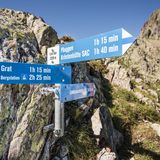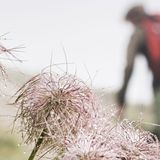
© davidschweizer.ch
Safety when hiking 10 useful tips
Hiking offers great opportunities to discover nature, share experiences, take on responsibilities and enjoy adventures. The following advice will help you to enjoy your hikes and deal with any dangers you may have to face.
These ten points are based on the recommendations made by the CAA and have been completed by the SAC training and safety experts. However, they can’t replace training courses, which provide a solid base and help you expand your competences and improve your technique with qualified instructors.
10 tips
1. Fit and healthy
Hiking in the mountains is an endurance sport. The effort it demands, which is beneficial for the heart and circulation, requires you to be in good health and able to assess your abilities. Avoid being pushed by time and adopt a pace which is suited to all members of the group.
2. Careful planning
Information about distance, height differences, the level of difficulty and the conditions can be found on maps, in guide books, online or by asking experts. The weather forecast is particularly important as storms, snow, wind and cold weather can greatly increase the risk of accidents. Make sure that the itinerary is adapted to the level of the group and always plan alternative ones. Take note of the emergency mountain rescue phone numbers of the country (REGA: 1414; European emergency number: 112).
3. Proper equipment
Make sure that you have the correct equipment and that your rucksack is not too heavy. You should always bring what you need to protect yourself from rain, cold weather and the sun. Good walking shoes provide a better grip. Make sure that you take a first aid kit, a survival blanket and a mobile phone with you – you’ll be happy to have them on you in case of an emergency.
4. Suitable shoes
Good hiking boots protect your feet, support them and give you a better grip. When choosing your boots, make sure they fit properly, have a profiled sole with a good grip and that they are waterproof and light. Ankle boots provide better support especially when your feet are tired or on longer walks.
5. Be sure-footed
It doesn’t take much to fall – we all stumble and slip sometimes. Falls are the main cause of accidents! Bear in mind that fatigue and a sustained pace considerably reduce your concentration and the steadiness of your steps. Beware of rockfalls: by walking carefully you can avoid loosening stones.
6. Stay on the marked paths
Where there is no path, there is an increased risk of becoming disorientated, falling or being hit by a stone. Avoid shortcuts and if you have left the path, go back to where you can find your way again. NB Never underestimate steep snowfields, they are dangerous. The mountain hut attendant will be able to advise you.
7. Take regular breaks
Taking a good break allows you to rest, enjoy the scenery and chat with your companions. To keep up your energy levels and your concentration, it’s important to eat and drink. Plenty of unsweetened drinks and a good picnic (cereal bars, dried fruit, chocolate, cheese, air-dried meat, nuts, and gingerbread) will provide you with enough energy for the whole day.
8. Look after children
Remember that for children, the most important is that they enjoy the experience and discover new things. Where there is a risk of falling, an adult can only look after one child. Belay the child with rope in the difficult stretches. Bear in mind that long, demanding hikes are not suitable for children.
9. Small groups
In smaller groups, there is more flexibility and it is easier to help each other. Make sure a family member knows your destination, what route you have planned and when you expect to be back. Stay in the group. Solo hikers beware: minor incidents can easily turn into serious emergencies.
10. Respect for nature and the environment
The mountains are a very precious place for discovering the uniqueness of nature. Appreciate this freedom and respect the fragile environment. Protect nature in the mountains by taking your rubbish away with you, not making any noise, staying on the paths, not disturbing the wild animals (or those in pastures), not picking any plants and respecting the protected zones.

